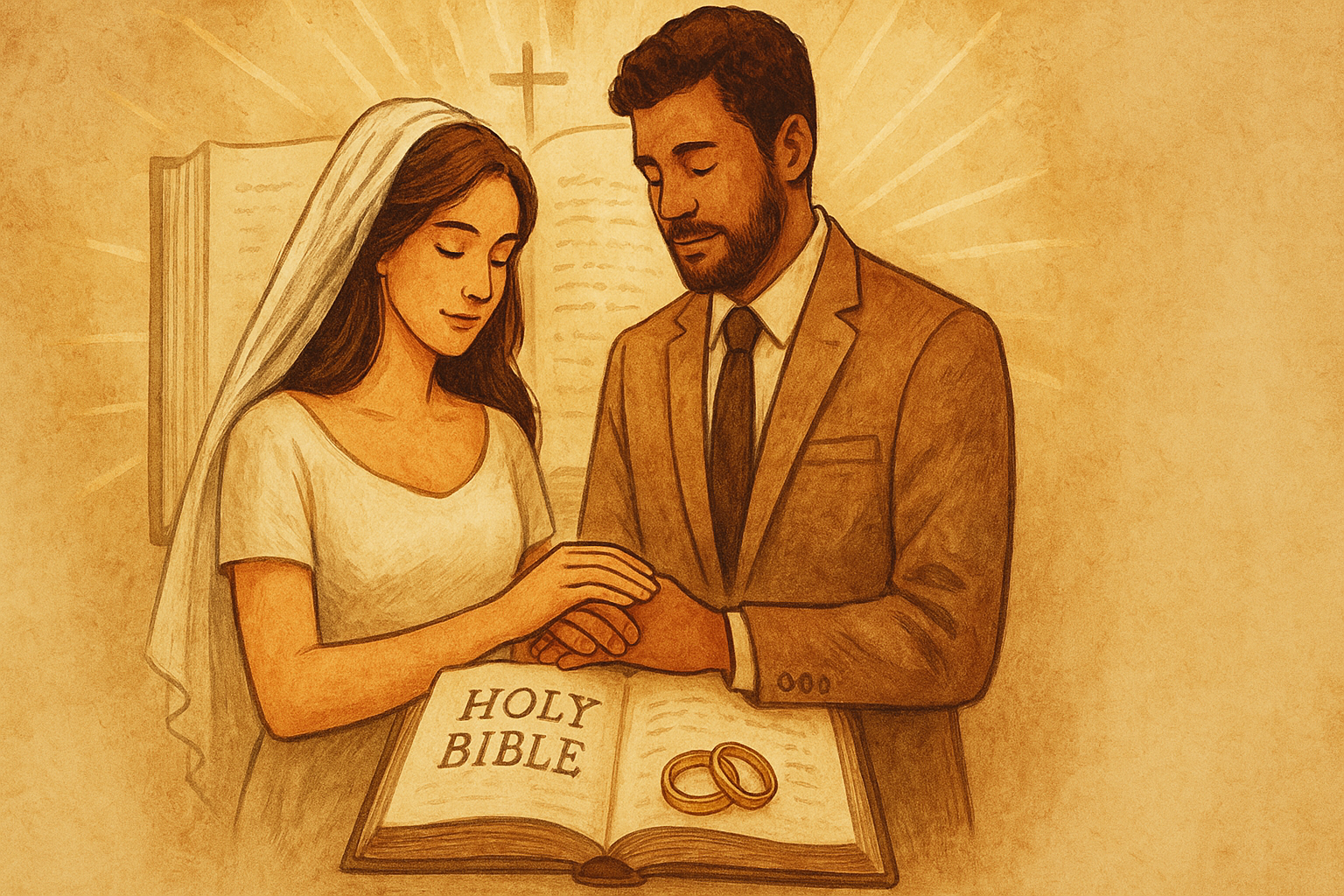God’s Design and the First Marriage
From the very beginning, the Bible presents marriage not as a human invention or a social contract, but as a divine institution initiated and blessed by the Lord God. The first marriage recorded in Genesis 2 serves as the blueprint for every union that follows. In this sacred act of creation, God fashioned woman from man’s side—not from his head to rule over him, nor from his feet to be trampled, but from his rib, near his heart, to be loved and cherished.
« Then the Lord God said, ‘It is not good that the man should be alone; I will make him a helper fit for him.' » (Genesis 2:18, ESV)
This passage introduces the foundational purpose of marriage: companionship and complementarity. The idea of a “helper fit for him” implies mutual support, equality, and partnership. The institution of marriage is God’s answer to humanity’s need for connection—not merely emotional or physical, but spiritual.
The first marriage between Adam and Eve was not a casual arrangement. It was God’s plan in action, revealing His intent for intimate relationships that reflect His love, unity, and glory. In Genesis 2:24, we read the profound outcome of this divine union:
« Therefore a man shall leave his father and his mother and hold fast to his wife, and they shall become one flesh. »
This concept of “one flesh” is both mysterious and sacred. It symbolizes unity in body, soul, and spirit. It mirrors the relational nature of the Trinity—Father, Son, and Holy Spirit—three in one. Likewise, in biblical marriage, husband and wife become a united team, working together to fulfill God’s purposes on earth.
Furthermore, the image of God is reflected in both male and female. Genesis 1:27 says, “So God created man in His own image, in the image of God He created him; male and female He created them.” This truth reinforces the idea that marriage isn’t simply about compatibility, attraction, or economics. It is about reflecting the glory of God through the lifelong commitment of two image-bearers becoming one.
Marriage also points toward God’s covenantal love. Unlike fleeting relationships based on feelings or personal gain, a biblical marriage reflects God’s love—faithful, enduring, and sacrificial. When we say “I do,” we are not only committing to each other but also stepping into a divine covenant with God at the center.
Another significant reason why marriage matters is its role in fulfilling God’s design for humanity. In the creation account, God gave Adam and Eve a joint mission:
“Be fruitful and multiply and fill the earth and subdue it…” (Genesis 1:28)
This directive emphasizes that marriage is not just personal; it’s missional. Through godly families, God builds societies, spreads His truth, and nurtures the next generation in His Word.
Sadly, in our culture today, marriage is often devalued or misunderstood. But returning to God’s Word reminds us that it is a good thing, a holy bond that carries deep meaning and purpose. As believers, we are called to honor marriage as God’s idea—not just for companionship, but for representing God’s image, fulfilling His mission, and reflecting His love.
Marriage as a Reflection of Christ’s Love
While the first marriage in the Garden of Eden reveals God’s original design, the New Testament deepens our understanding by portraying marriage as a living symbol of the relationship between Jesus Christ and His church. This divine parallel brings us to another powerful biblical reason for marriage: it reflects the Lord God’s love for His people in a tangible, visible way.
“Husbands, love your wives, as Christ loved the church and gave himself up for her…” (Ephesians 5:25)
This passage from the Apostle Paul is not just poetic—it’s God’s Word commanding husbands to love with sacrificial devotion. Just as Christ laid down His life for us, a husband is called to lay down his desires, his ego, and even his pride for the sake of his wife. In this marriage relationship, we see a reflection of the gospel—redemption, grace, patience, and service.
This leads us to understand marriage as a sacred union where both husband and wife embody roles that glorify God. The wife of your youth is not just a romantic partner, but a co-heir of eternal life, deserving of honor and respect. In 1 Peter 3:7, Peter urges husbands to live with their wives in an understanding way, acknowledging them as the “weaker vessel,” not in terms of value, but in terms of care and protection. It’s a call to mutual love, not superiority.
In God’s plan, marriage also offers a safe space to pursue sexual intimacy without shame. Within the marriage bed, this physical union becomes holy—not just permitted, but celebrated.
“Let marriage be held in honor among all, and let the marriage bed be undefiled…” (Hebrews 13:4)
This scriptural command affirms what many cultures have tried to diminish—that sexual intimacy is reserved for the sacred covenant of marriage. It is within this union that desires are expressed in a God-honoring way, guarding against sexual immorality, temptation, and emotional fragmentation.
Paul reinforces this in 1 Corinthians 7, where he speaks about spouses meeting each other’s needs and not depriving one another, lest they fall into temptation. Here, own husbands and own wives are urged to recognize that their bodies are not solely their own. There is a shared stewardship of love, care, and physical affection.
This scriptural teaching reveals one of the essential purposes of marriage—to provide a healthy, godly outlet for our desires. As young people navigate a world filled with distorted views of relationships, the Bible offers a better way—one grounded in truth, faithfulness, and covenant.
Sadly, some misuse marriage for control or manipulation, falling into what can be considered narcissistic tendencies or power imbalances. But a biblical marriage is the antithesis of this. It’s about humble service, lifelong commitment, and reflecting the image of God through mutual love and selflessness.
Just as the church submits to Christ, so too is the wife called to submit to her husband (Ephesians 5:22-24)—not as an act of inferiority, but of order and mutual trust. The husband, in turn, leads not as a dictator, but as a servant-leader under Jesus Christ.
Thus, Christian marriages are not just personal relationships—they are spiritual representations of divine truths. When lived according to God’s purposes, they become testimonies of God’s love, grace, and eternal life.
Marriage as a Covenant for Growth, Unity, and Purpose
Marriage in the Bible is far more than a legal agreement or a cultural tradition—it is a covenant before the Lord God, rooted in His design and grounded in His Word. A biblical marriage offers one of the most intentional contexts for personal growth, spiritual maturity, and the pursuit of God’s plan for one’s life.
The first marriage between Adam and Eve was about companionship and completion. God saw that it was “not good for man to be alone,” and so He created a suitable partner—“bone of my bones and flesh of my flesh” (Genesis 2:23). This divine partnership was not just about help in tasks, but about reflecting the image of God in unity, diversity, and relationship.
Marriage, then, becomes the ideal context for becoming more like Christ. It challenges us to live sacrificially, to forgive continually, and to serve without expectation. Few other relationships put our own desires and own needs into such a sharp focus. The intimate relationship of marriage reveals both our strengths and our flaws—calling us to grow in grace and humility.
🔹 The Marriage Covenant: More Than a Contract
Unlike a domestic partnership or civil union, the marriage covenant is a sacred bond designed by God Himself. It is not based on temporary feelings or changing circumstances but on a solemn promise to remain united through all seasons of life. This mirrors God’s covenantal love toward His people—unwavering, unconditional, and eternal.
“Therefore what God has joined together, let no one separate.” (Mark 10:9)
This covenant binds Christian couples not only legally but spiritually. In a world that often treats marriage as disposable, Scripture reminds us that the institution of marriage is holy and set apart. It’s a place where good times and bad are met with the same commitment and faithfulness.
🔹 Spiritual Intimacy and Mutual Edification
Another biblical reason for marriage is to promote spiritual growth through shared devotion. A husband and wife are called to pray together, study the Word of God, and spur one another on toward godliness. As married people, their unity of the Spirit is a powerful testimony to their families and communities.
The apostle Paul, in 1 Corinthians 7, acknowledges the spiritual benefits of singleness but also upholds marriage as a legitimate, even preferred, path for many to avoid sexual immorality and to channel their passions in a God-honoring way.
Furthermore, a strong marriage becomes a safe space for spiritual accountability. Within this sacred bond, each partner helps the other walk in obedience, humility, and purpose. A healthy marriage fosters vulnerability and transformation—not through judgment but through encouragement, much like Christ’s love for the Church.
🔹 God’s Purposes in Marriage: A Bigger Picture
Marriage is not solely about the couple—it plays a vital role in fulfilling God’s purposes on Earth. It is through families that children are raised, values are passed on, and communities are shaped. The Bible often describes blessings and favour of the Lord upon households that honor Him.
“He who finds a wife finds a good thing and obtains favor from the Lord.” (Proverbs 18:22)
This good thing is not just romantic companionship, but the marriage relationship functioning as God intended—spiritually aligned, emotionally connected, and missionally focused.
When marriage is done according to God’s design, it doesn’t just benefit the couple—it becomes a vessel for advancing the Kingdom of God, showing the world what God’s love looks like in real life.
Reflecting God’s Love and Fulfilling His Purposes Through Marriage
Marriage, as portrayed throughout both the Old Testament and the New Testament, is not just about personal happiness—it’s about God’s image, God’s love, and God’s plan being revealed through the sacred marriage relationship. It is a mirror of the covenant between Jesus Christ and the Church—a divine reflection of sacrificial love, unwavering faithfulness, and eternal commitment.
🔹 Marriage Reflects Christ and the Church
The apostle Paul beautifully draws this parallel in Ephesians 5:25-27:
“Husbands, love your wives, just as Christ loved the church and gave himself up for her to make her holy.”
This is one of the most powerful portrayals of marriage in the Bible. The purpose of marriage is to reflect the Gospel. A Christian couple is called to model a sacrificial, servant-hearted, and redemptive love—the same love that Jesus Christ showed when He laid down His life.
This is not about dominance or control but about mutual submission out of reverence for Christ. In doing so, marriage becomes a testimony of the kingdom of God, offering a tangible example of God’s love in action.
🔹 Building Stable Families and Godly Legacies
Marriage is also the foundation for building stable families and raising up the next generation. The Bible is filled with wisdom on how young people, older women, and married couples are to live out their roles faithfully.
From the book of Ruth to the Song of Solomon, we see the beauty and strength of marriages built on godly principles. It’s no surprise that many biblical reasons for marriage are tied to family, teaching, and legacy.
Children born into a biblical marriage have the opportunity to see godly life lived out daily. They witness forgiveness, patience, sacrifice, and prayer. These impressions often shape their understanding of God’s design for human relationships and their future choices.
🔹 Marriage Strengthens Character and Deepens Faith
One of the most overlooked benefits of a healthy marriage is its ability to refine character. Within the lifelong commitment of marriage, spouses often face challenges that require hard work, humility, and grace. These trials are not punishments—they are God’s purposes at work, molding individuals to become more like Christ.
Whether through sexual intimacy, emotional vulnerability, or shared spiritual disciplines, marriage provides the perfect soil for growing fruits of the Spirit—love, joy, peace, patience, kindness, and more. The marriage bed is not only a place of physical union but of trust, unity, and celebration under the blessing of God’s Word.
“Two are better than one, because they have a good reward for their labor.” (Ecclesiastes 4:9)
Indeed, marriage is a good reward, a sacred institution designed not just for companionship, but for purpose, spiritual unity, and eternal impact.
🌿 Conclusion: The Sacred Union God Designed
In a world that questions the value of marriage, Scripture stands firm and clear: Marriage is God’s idea. It was established from the beginning, reaffirmed by Christ, and taught by the apostles. From sexual intimacy to spiritual growth, from family building to reflecting the Gospel, the biblical reasons for marriage are vast and deeply meaningful.
Choosing to view marriage not as a contract but as a sacred union rooted in the Word of God transforms it into a journey of holiness, love, and God’s purposes fulfilled.
Whether you’re single, engaged, newly married, or celebrating decades together, understanding the purpose of marriage can reframe your perspective, renew your faith, and reignite your commitment.










